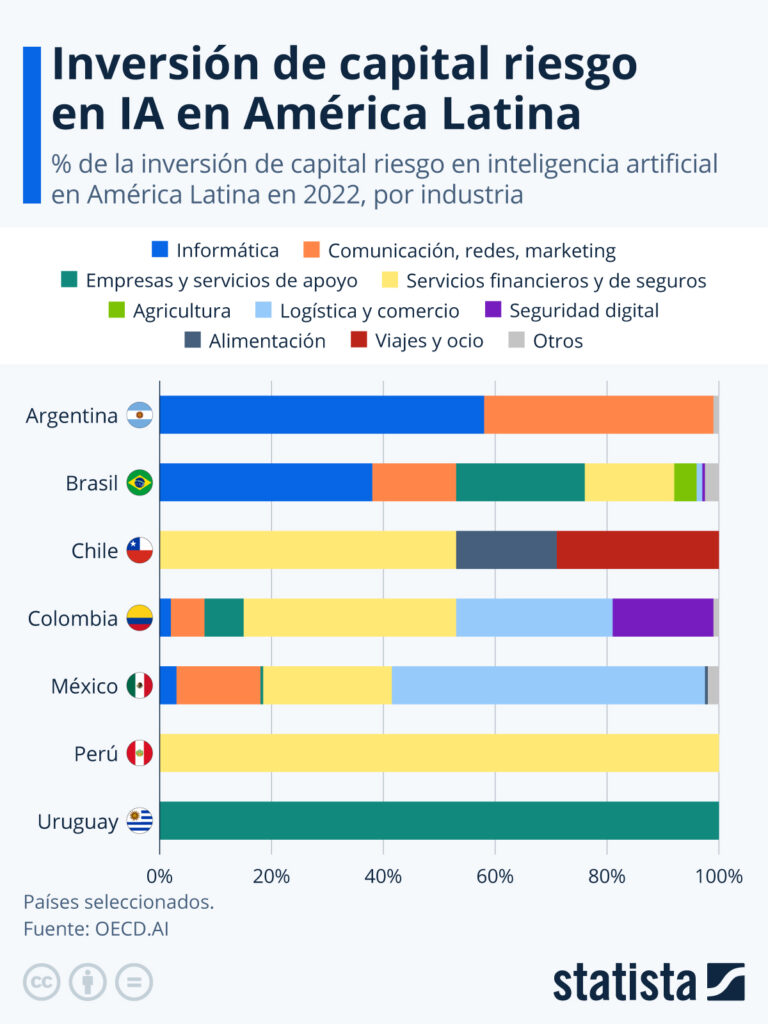
Por Jose Pulido
August 18, 2023
In recent times, Latin America has seen a marked increase in the adoption of Artificial Intelligence (AI) across various sectors. From process automation to sales and marketing optimization, companies are uncovering the potential of this technology to drive efficiency and growth.
As Daniel Scarafia, Vice President for Latin America and the Caribbean at Hitachi Vantara, explains in his column “Artificial Intelligence: The benefits outweigh the threats”:
“Today’s company, if it wants to be competitive, must have continuous improvement policies. However, this productive ecosystem consists of cells that make up one or several processes, which are nothing more than a set of actions executed within a workflow to achieve the company’s objectives.”
A venture capital fund ALLVP report reveals that 46% of corporate businesses in Latin America are already using AI in their daily operations. Even more striking is that 93% of these companies plan to implement it in the future. These figures reinforce the idea that AI is essential to maintaining competitiveness in today’s business landscape.
“Artificial Intelligence has forcefully entered various productive sectors, especially in technology and telecommunications, so we can still say we are in the early stages of exploiting the true potential of AI. The telecommunications and technology industry is the most prominent user of Artificial Intelligence, according to Statista studies. However, its implementation is also growing for risk operations and services in the financial sector,” Scarafia clarifies.
The OECD’s AI Policy Observatory provides a clear view of this phenomenon. In 2022, financial and insurance services led venture capital investments in AI in three of the seven Latin American countries analyzed.
In Peru, all venture capital investments in AI startups were absorbed by this industry, while in Chile and Colombia, the figures were 53% and 38%, respectively. Mexico showcases a different trend, with the logistics, retail, and wholesale industry-leading AI investments at 56%. IT infrastructure startups took the lead in Argentina and Brazil, with 58% and 38% of investments, respectively. On the other hand, Uruguay allocated all its AI investments to the business process and support service sector.

VC investment in artificial intelligence in Latin America. (Source: Statista)
Indeed, AI not only optimizes workflows and boosts productivity; in a complex economic scenario, its adoption allows businesses to make more informed decisions and, in the long run, translates into higher economic returns.
AI is transforming established not only companies but also the startup world. According to the ALLVP report, 32% of surveyed startups stated they have a focus on AI, and 71% already use it in their daily operations. These figures suggest that AI is considered a top priority at the executive level, and its importance is expected to keep growing.
However, despite its benefits, the adoption of AI also brings challenges. 55% of respondents mentioned concerns about data privacy, and 53% highlighted cybersecurity and regulatory compliance as significant risks. These challenges are shared by both established companies and startups, with 59% expressing concerns about data privacy.
Additionally, as emphasized by the Vice President for Latin America and the Caribbean at Hitachi Vantara:
“Indeed, there are not a few apocalyptic visions of a scenario that will reduce jobs due to the use of AI. However, the proliferation of these platforms is more an opportunity to precisely improve productivity, streamline processes, and also in predictive data analysis.”
Another vital aspect to consider is the expansion of the Internet of Things (IoT) and mobile computing applications. These devices generate a vast amount of data at the network edge. To harness the potential of big data, it’s necessary to drive AI to the network’s edge.
AI is playing a pivotal role in transforming businesses in Latin America. Its potential to drive innovation and enhance efficiency is undeniable. However, it’s essential to address associated challenges to ensure safe and effective adoption of this technology in the region.